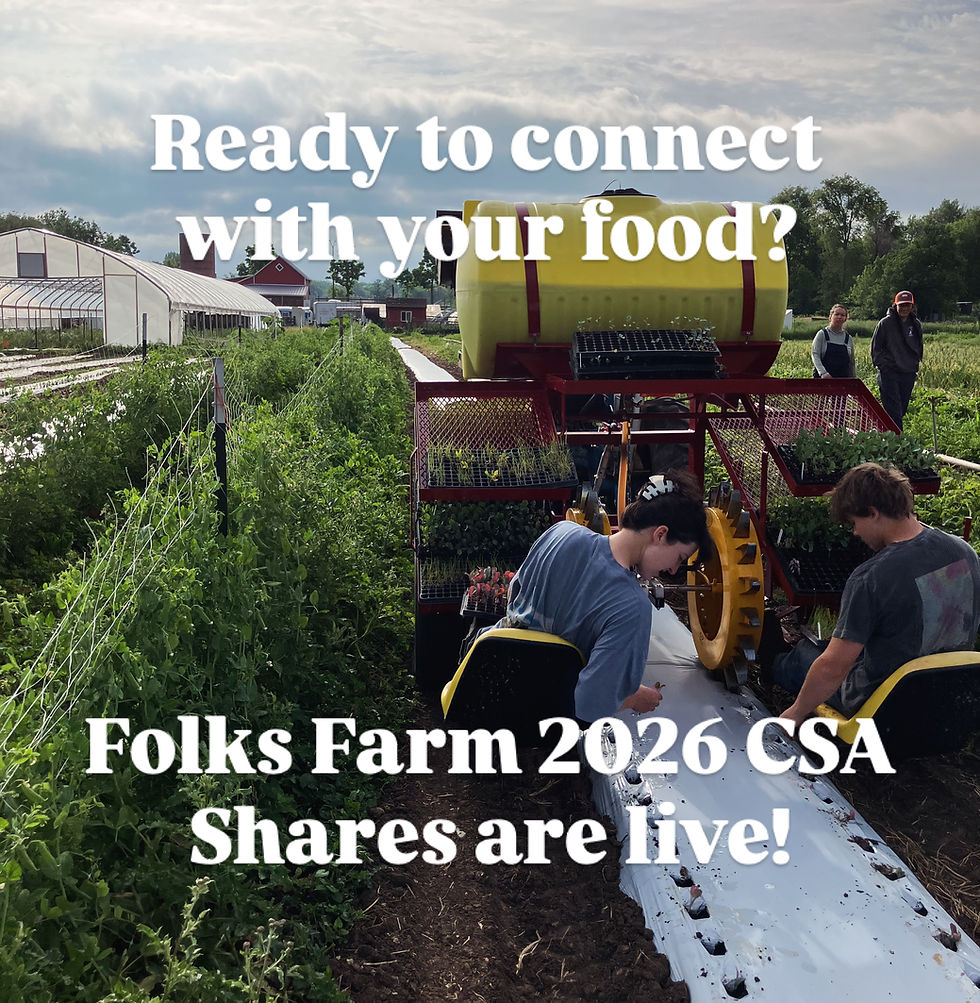The Heart of the Farm
- Alex Zeidner

- Dec 8, 2021
- 4 min read
Images left to right: Rich Pecoraro straddling beds at MASA Seed foundation's farm in Boulder County (the plant diversity growing here is astounding), onions we selected to replant for seed (if you have enjoyed our onions this year this is where they came from), Rich showing off Anasazi Flour Corn a plant cultivated by humans for thousands of years.
It took a dreary winter day to pull the seeds from storage. Once a shoebox, this collection has grown to bins of vegetable, flower, grain, and herb seeds. Inside are hundreds of bags. Some seed is from large sellers, crops we do not have access to locally or are unable to grow well in Colorado’s Front Range. The seeds that pull the heartstrings are labeled with hand written notes. Batches of seeds grown in our region, adapted to our hands. There is history here tucked away in packs of seeds; the oldest found was a Kuroda Carrot from 2007, a year before I first farmed.
Nostalgia floods my body as I return the seeds we have been using this season back with those who remained in the collection. While doing so I am making order notes for upcoming plantings and deeper crop planning. I am proud to say this upcoming year will be the smallest seed purchase Folks Farm will make since it was founded. Our labor has yielded an impressive amount of diverse crops, just scratching the surface of the generational devotion and love it took for these seeds to reach my hands.
Humans share a kinship with regional seeds. Local seeds are not anonymous packages that arrive on the doorstep from unknown origins. I recently called a mentor of mine, Rich Pecoraro, to catch up. Pecoraro is a lifelong seed steward whose work has culminated in MASA Seed Foundation, a non-profit in Boulder County dedicated to growing regional seed at scale (see link below for more information). He has personally contributed more to my plant growing knowledge and seed collection, than any book, podcast, or online video. Working together years ago I first learned about regional adaptation, directly inspiring me to pursue farming professionally. He lives a story of humans and plants dancing together through eons of time, choosing one another, and moving in concert through the season’s rhythms. A dance that changed teosinte, a large seeded grass, into the Mother Corn our population survives on today. Indigenous relationships between humans and plants that have created every vegetable we consume.
Plants are unique to humans because they are mostly sedentary. Where a seed sprouts so it grows (which actually might not be too different from humans, have you ever been in two places at once?). Do not mistake this trait for less than being mobile. Plants are equipped with the skills to grow in extreme conditions, successfully bear fruit, and give life to future generations all through interactions with air, sunlight, and soil. Adverse environments kick on genetic responses in the plants, creating healthier food and imparting information to their offspring. I watched a tomato plant take root outside our farm stand this year. Without receiving water, in direct sun, and against a hot stone wall this tomato produced a handful of black plum fruits (even continuing to live after several frosts). This plant demonstrates how positivity will produce fruits even in the toughest conditions. Our role as seed stewards is to witness plants and notice the outliers. The plants that perform in exceptional ways (drought tolerance, interesting fruit, higher yields, different structure, bolt resistance, etc) become the parents and are left unpicked for the seeds to ripen deeper into the season.
Year after year we grow our favorite varieties and our love for them deepens. Sprouting the seeds you have selected and saved is like seeing an old friend after months, or even years, apart. It is a profound experience to witness such diversity through the continuity of gardening. To know that everything we need is right here, that the world is full of abundance, and needs the dance of humans to continue to breed food crops is a powerful feeling. I was recently reflecting on the power of seeds with a CSA member. Consider a wheat plant started from one seed produces over 100 seeds at the time of harvest!
As a small-scale grower my motivation can waver. There were a couple weeks in 2020 when the grocery stores shelves had been pillaged and food seemed scarce. At least once a year a crop like onions or lettuce gets recalled nationwide because of a food borne pathogen. For the most part though, the shelves are stocked often with organic options.
Seed work breathes heart into how I farm, giving me energy in tough times. When we plant a seed personally saved we perpetuate a primordial dance with our ancestors and reinforce a resilient way of living. By tapping into this evolving lineage gardeners gain access to millions of years of energy carried on one season at a time. Even if I am growing the same variety as a friend down the road we interpret the plants differently, selecting for slightly different traits, or finding weirdos to create new varieties. The deepening relationships between growers and plants provides me with a reason to grow, to adapt, and to continually strive to leave something better for the next generation to grow.
MASA Seed Foundation- https://www.masaseedfoundation.org/








Comments